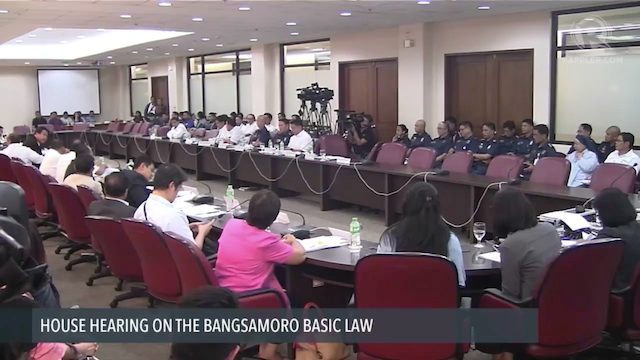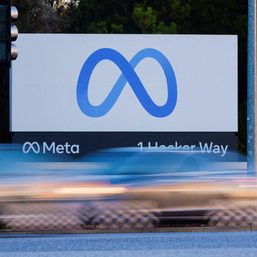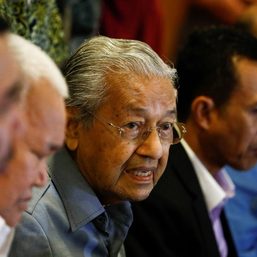SUMMARY
This is AI generated summarization, which may have errors. For context, always refer to the full article.

MANILA, Philippines – Months after the Mamasapano clash, the Senate and the House of Representatives are shaping what could be different versions of the proposed Bangsamoro Basic Law (BBL) as discussions gain traction once again.
While House ad hoc committee on the BBL chair Rufus Rodriguez has backed the political and fiscal autonomy sections of the bill, except for 8 provisions, his counterpart in the Senate, Senator Ferdinand Marcos Jr, has expressed reservations about the same.
Asked what “concerns him most” about the proposed law, Marcos, in an interview with ANC’s Headstart on Wednesday, April 22, mentioned two things: the “form of administration” in the Bangsamoro and the scope of the plebiscite for the law.
“What concerns me the most is the form of administration. Exactly how it is going to work. The plebiscite, also. There are now an increasing number of people who are questioning whether it is of local application or national application. In other words, whether the plebiscite will be conducted nationally or only in those areas that have been designated,” Marcos said.
Under the bill, the envisioned Bangsamoro autonomous region will have a parliamentary form of government, where a chief minister will be elected among the representatives elected by the people.
This proposed form of government is the subject of constitutional questions, among others. Senator Miriam Defensor-Santiago, chair of the Senate committee on constitutional amendments, has taken the position that the BBL is unconstitutional because it creates a substate.
Rodriguez, meanwhile, sees “no problem” with the creation of a Bangsamoro parliament and says he believes the Constitution allows for such set-up.
Marcos told ANC that a parliamentary form of autonomous regional government is “difficult because it is something we’ve never done before.” Unlike other federal forms of government, he said, the Philippines will not have a “constant or identical form of voting” in “federalized states” but rather one ministerial government different from the rest of the country.
Marcos is also toying with the idea of requiring a national plebiscite for the BBL, not just in core areas – a proposal that is not among the 8 provisions that, according to Rodriguez, is set to be changed.
“The argument is that it affects everyone, every single citizen. There is a good argument that can be made that way. So perhaps it should be done nationally. But again, as a practical matter, we know the result of that. Maybe a month, two months from now, it’ll be different. But as it stands now, it is a very precarious political problem,” he said.
Fiscal autonomy
Another key difference between the House and the Senate committee chairs is the issue of the block grant or the automatic appropriation scheme for the Bangsamoro.
Under the BBL, the Bangsamoro government is designed to get a block grant of 4% of the 60% share of the national government in the total internal revenue allotment (IRA). This means the Bangsamoro is designed to get 2.4% of the total revenue collection.
Under the scheme, the regional government will no longer have to ask for the approval of Congress for the annual budget, unlike the current set-up with the Autonomous Region in Muslim Mindanao (ARMM).
Instead, the amount will be automatically computed through the proposed formula, much like the internal revenue allotment of local government units. The future Bangsamoro government will also be required to pass a law on how the budget will be spent every year.
The block grant on the Bangsamoro’s first year of operation in 2016 is estimated to amount to P27 billion. Under the BBL, the regional government will also receive P1 billion for the transition from the ARMM to the Bangsamoro government and a P 7-billion Special Development Fund for the first year.
Earlier estimates of the total budget for the entire Bangsamoro region pegged it at P70 billion, a computation that included the IRA of LGUs and the budget that goes to the national governments in the region.
The Office of the Presidential Adviser on the Peace Process later clarified the “misinformation” and said that only about P35 billion will go to the Bangsamoro autonomous government in its first year of operation. The IRA for LGUs, as well as the budget allocations for national agencies operation in the region will remain untouched.
Some lawmakers both in the House and the Senate oppose the block grant for allegedly being too much and for being unfair to other LGUs. Marcos shares the same sentiment. (READ: Senate set to cancel 2 Bangsamoro law provisions)
Rodriguez, meanwhile, recognizes that the block grant is a necessary scheme if the intent is to give the autonomous region more teeth.
“If the Bangsamoro will be given more powers, there should be more funding,” Rodriguez said.

Passing a ‘meaningful BBL’
The parliamentary form of government and the fiscal autonomy scheme are some of the two key features of the envisioned Bangsamoro region that differentiates it from the ARMM.
The Moro Islamic Liberation Front (MILF) has said that it will not accept a diluted version of the law. The MILF signed a peace deal with the government in 2014 that is now the basis of the proposed law.
In an opinion piece on Mindanews, journalist and peace advocate Patricio Diaz wrote that the “higher hurdle” for a “meaningful BBL” is the Senate.
He said the “imperative” right now is to convince the House and the Senate to collaborate to pass the same version.
Diaz wrote: “Is there hope for the passage of the meaningful BBL? Only if the House version is as Rodriguez has intimated, and the Senate collaborates with the House! Deleting only those 8 provisions with fiscal autonomy ensured and the parliamentary-ministerial government structure, impliedly together with the asymmetric relation, considered as not in violation of the 1987 Constitution virtually keeps Draft BBL intact.”
Reconciling conflicting provisions
Cagayan de Oro Representative Rufus Rodriguez told Rappler that the two committee chairs have held initial talks about the bill, but they have yet to discuss how they will reconcile the possible conflicting provisions in the proposed law.
During their initial meeting, the two agreed to strike out the creation of autonomous branches of constitutional bodies such as the Commission on Human Rights, Commission on Audit, Commission on Civil Service, Commission on Elections and the Ombudsman in the Bangsamoro.
Rodriguez said the Senate and the House should be allowed to produce their own versions of the bill first before any discussions on how to proceed can be pursued.
A proposed law usually goes through the bicameral conference committee if there are conflicting provisions between the House and Senate versions – unless one chamber agrees to adopt the other chamber’s version.
“While things have not been completed by both houses, we cannot discuss fully. The chairman can hold initial discussions but we should also bring out to each other the product of the committee because when we talk, we are just expressing our opinions. We have not voted on the bill yet,” Rodriguez said.
The House and the Senate leadership agreed to pass the measure by June. The subsequent plebiscite is targeted to be held before the filing of certificates of candidacies in October for the May 2016 elections.
2016 elections and BBL chances
Asked what will put the passage of the BBL in further jeopardy, Marcos acknowledged that the 2016 elections will play a role as politicians gauge public sentiment about the bill.
“Well, if it becomes a political issue, we have an election in 2016, and if the sentiment of people is still that, and people will ask the congressmen: “Did you vote for BBL, which we do not support?” then it becomes a political issue. Then, people would have to listen. All of us elected officials will have to listen to the general public’s opinion,” Marcos said.
The senator said he believes the public has “lost faith in the entire process.” A transcript of the ANC interview on his website links to a story citing the March SWS survey on the BBL that was conducted in the aftermath of the Mamasapano tragedy.
It also does not help that the MILF does not want to cooperate with authorities in the investigation and has stood firm against turning over erring members, Marcos said. (READ: Death of SAF troops ‘murder all the way and around’) – Rappler.com
Add a comment
How does this make you feel?





There are no comments yet. Add your comment to start the conversation.